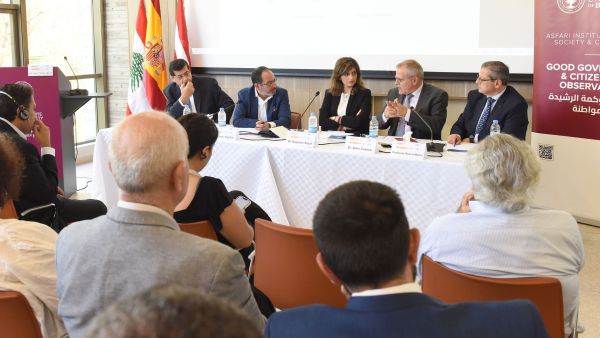Panel at AUB on Administrative Decentralization in Lebanon: Prospects, Challenges, Policy Pathways, and the Critical Role of Women and Gender Equality

The Good Governance and Citizenship Observatory (GGCO) at the Asfari Institute for Civil Society and Citizenship at the American University of Beirut (AUB), in collaboration with the Observatory on Public Service and Good Governance at Saint Joseph University of Beirut (USJ) and the Embassy of Spain in Lebanon held a panel discussion titled “Administrative Decentralization in Lebanon: Prospects, Challenges, Policy Pathways, and the Critical Role of Women and Gender Equality.” The panel was attended by the Spanish Ambassador in Lebanon Jesús I. Santos Aguado, the former Minister of Interior Ziyad Baroud, and a number of diplomats, academics, analysts, and experts.
This academic forum aimed to examine the legal, institutional, social, and political dimensions of administrative decentralization in Lebanon, and to provide a platform for dialogue between academics, practitioners, and decision-makers on possible ways of progress, while focusing on empowering women's voices in this field.
Among the participants was Dr. Rayyan Assaf, former president of the Legal Department at the Lebanese Presidency, Dr. Alan Cuenca, director general of the Institute for Fiscal Studies at the Spanish Ministry of Economy and Finance, and Mahmoud Batlouni, founder and president of Innovative Institutional IDEAS. The discussion was moderated by Dr. Simon Kachar, founding director of GGCO and lecturer of political sciences at AUB, with closing remarks by Professor Pascal Monin, director of the Observatory on Public Service and Good Governance and professor of political sciences and international affairs at USJ.
Lina Abou Habib, the Asfari Institute’s director, welcomed the attendees, highlighting the significance of this dialogue’s timing in light of the complex crises Lebanon is facing as it adds more urgency to the topic of administrative decentralization. Abou Habib noted that the collaboration with the Embassy of Spain in Lebanon offers a valuable space for exchanging expertise and experience between the two countries, while promoting a common understanding of challenges and opportunities. She also acknowledged the Asfari Institute’s role in providing a safe space for dialogue on issues that are often controversial and polarized, asserting that these discussions contribute to shaping new ideas and innovative solutions.
In his opening remarks, Ambassador of Spain in Lebanon Jesús I. Santos Aguado spoke about the “Dialogues in Plural Feminine” initiative launched by the Embassy of Spain in 2021, which seeks to promote gender equality across multiple fields, in partnership with Lebanese academic institutions and civil society. He said, “Over the past three years, our dialogues have explored the role of women in politics, culture, environment, business, science, and more. Today, we turn to administrative decentralization.”
He continued, “As you know, the Taif Agreement opened the path—still unfinished—toward decentralization in Lebanon. Our aim is to contribute to this debate by highlighting women's role in shaping it, in line with the government's ministerial declaration, which calls for eliminating discriminatory laws, and ensuring women's effective participation in decision-making at all levels of public and private life.”
He concluded, “It is crucial that policies continue to advance equal access to public responsibilities and leadership. This is not a matter of fairness for women, but also a way to strengthen the Lebanese political system and to build a more inclusive and equitable society."
In his opening notes, Dr. Simon Kachar, founding director of GGCO and lecturer of political sciences at AUB, addressed the historical and political background and significance of administrative decentralization in Lebanon, noting that this reform is an essential part of the political resolution, as explicitly stated by the Taif Agreement. He said, “The successful implementation of decentralization in Lebanon depends on how it is designed and implemented in an accurate and well-balanced manner in order to avoid divisions and achieve the desired benefits.”
Kachar spoke of the expected positive impacts of decentralization, such as “reinforcing local participation, improving services, reducing political tension, and promoting sustainable development,” as opposed to the major challenges that accompany it, such as “sectarian tensions, inequitable distribution of resources, the need for public sector reforms and local capacity building, maintaining the balance between local and national authorities, and ensuring national security.”
He also noted that the decentralization bill, which was developed in 2012 under the leadership of former Minister of Interior Ziyad Baroud, was an earnest effort to develop an inclusive framework that remained pending, however, in parliamentary committees due to subsequent political crises.
During the discussion, Dr. Rayyan Assaf tackled the constitutional background of the administrative decentralization bill and how its developing committee was formed in 2012, as well as the committee’s mechanism of action and the reasons that have hindered the bill’s approval to this day. She also discussed the financial aspect of decentralization and the role of women in local participation.
Dr. Alan Cuenca, director general of the Institute for Fiscal Studies at the Spanish Ministry of Economy and Finance, commented on Spain’s experience in promoting women’s political participation within the decentralization framework, whereby women's representation in the Spanish regional parliaments exceeded their representation nationally, even before the equality laws were enforced. The discussion also addressed the readiness of Lebanese municipalities to adopt gender budgeting. Experiences from Spain involving taxation policies and early education to support working women were also presented during the discussion.
Later, Mahmoud Batlouni, founder and president of Innovative Institutional IDEAS, discussed the reasons for proposing several administrative decentralization laws since 1995, as well as the most prominent administrative and financial impediments that face institutions that were established under the decentralization law. Batlouni spoke of the importance of developing mechanisms that enhance transparent and efficient work in local municipalities and institutions.
In his intervention, Professor Pascal Monin, director of the Observatory on Public Service and Good Governance at USJ, explained that “in Lebanon, administrative decentralization has always been raised as an essential reform, but the impediments it faced were not only legislative, logistic, or technical, but also political, cultural, and social. Hence, any feasible vision for the path towards decentralization must be based on progression, experience, community engagement, consistent evaluation, and, particularly, embedding gender equity and equal participation of women.”
Monin added, “Expanded administrative decentralization requires, first and foremost, the presence of the state. We are at the age of reclaiming the state, which is the starting point. The President of the Republic of Lebanon, Joseph Aoun, as well as the government’s ministerial declaration, have ensured the commitment to achieving this decentralization. Here, I emphasize that administrative decentralization does not weaken central authority. On the contrary, it cannot be carried out without this authority.”
The conversation ended with an open discussion with the attendees, raising questions on the viability of administrative decentralization in enhancing local participation and achieving gender equality as well as the importance of creating a legal and institutional environment for a successful reform path.
Background Information
American University of Beirut
Founded in 1866, the American University of Beirut is a teaching-centered research university based on the American liberal arts model of higher education. AUB has over 9,000 students and over 1,200 instructional faculty members. The University encourages freedom of thought and expression and seeks to graduate men and women committed to creative and critical thinking, lifelong learning, personal integrity, civic responsibility, and leadership.






